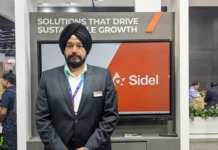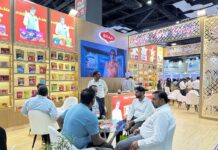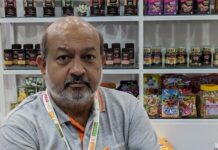Volpak, a Barcelona-based Coesia group company, is specialized in the designing and marketing of flexible packaging solutions. Coffee is one of the fastest growing markets among the industries covered by the Spanish company. Working with many roasters in Europe and worldwide, it has long experience for the packaging of roasted beans and ground coffee. Today’s challenges are mainly around sustainability and flexibility.
Volpak for coffee – a concrete example for the Turkish market
Recently, the company had to face a new challenge on behalf of a Turkish roaster – an established business in this industry and a long time Volpak client that requested a full plant for the packaging of coffee beans, complete with an advanced degassing system. This is a common request among roasters, which is necessary to protect the product’s aroma and increase its shelf life, avoiding its contamination with oxygen.
The challenge is due to the fact that coffee cannot be vacuum packed after roasting, as the packages swell due to pressure and may break. In fact, freshly roasted coffee releases significant amounts of carbon dioxide. It is a slow process, since the coffee beans retain part of the gas after roasting and gradually release it. It is estimated that they can continue to emit CO2 for more than two weeks. Also, both oxygen and humidity, as well as other elements of the environment, can damage the coffee beans. To keep it fresh, with its aroma, its flavor and all its qualities, it is absolutely essential to isolate it from these threats.
A tailor-made solution
The solution developed by Volpak is based on the SP 170, a machine for pouch forming and filling, used by many customers for its durability and flexibility. In this specific instance, as is often the case, the company did not just provide a technologically advanced machine, but it also leveraged its expertise to assist the customer throughout the project development stage. In particular, Volpak helped the client in the identification and deployment of the best degassing system, based on valve operation.
The use of a degassing valve for coffee means that packaging can be carried out after roasting, thus saving storage time prior to packaging, and money in the medium term. The solution created by Volpak is based on the development of a unique system for air outflow. It is actually a one-way valve, which allows the exit of carbon dioxide and prevents the entry of oxygen and moisture. The degassing, through the valve, is carried out by leveraging a physical principle – the pressure of the film inside the valve increases with the heat and the hot air exits through one of the sides of the coffee valve. Once the external pressure is balanced with the internal one, the valve remains closed.
A portfolio of flexible and green oriented machines
In addition to this specific solution, Volpak offers a wide range of machines and systems for coffee packaging that are highly efficient and extremely advanced in terms of sustainability. Machines such as the SP 170 can use fully sustainable packaging materials, such as PLA. Other units, such as SC+, can also use paper, offering a wide range of applications for this and other industries. Volpak’s machines also boast a high level of flexibility, making them ideal for the secondary packaging inside pouches of products such as non self-protected coffee capsules, a solution that can be ideal for industries such as hospitality.
IndiFoodBev — authentic, impactful and influential
An English-language food and beverage processing and packaging industry B2B platform in print and web, IndiFoodBev is in its third year of publication. It is said that the Indian food and beverage industries represent approximately US$ 900 billion in revenues which implies more than 20% of the country’s GDP. Eliminating the wastage on the farmside can help to deliver more protein to a higher number of the population apart from generating sizable exports. The savings in soil, seeds, water, fertilizer, energy and ultimately food and nutrition could be the most immense contribution that country is poised to make to the moderation of climate change.
To improve your marketing and grow sales to the food and beverage processing and packaging industry, talk to us. Our research and consulting company IppStar [www.ippstar.org] can assess your potential and addressable markets in light of the competition. We can discuss marketing, communication, and sales strategies for market entry and growth.
Suppliers and service providers with a strategy and budget for targeted marketing can discuss using our hybrid print, web, video, and social media channels to create brand recognition linked to market relevance. Our technical writers are ready to meet you and your customers for content.
The second largest producer of fruit and vegetables in the world is continuously expanding processing capacities and delivery systems with appropriate innovative technologies. We cover product and consumer trends, nutrition, processing, research, equipment and packaging from farm to thali. Get our 2025 media kit and recalibrate your role in this dynamic market. Enhance your visibility and relevance to existing markets and turn potential customers into conversations. Ask for a sample copy of our bi-monthly in print or our weekly IndiFoodBev eZine each Wednesday.
For editorial info@ippgroup.in — for advertisement ads1@ippgroup.in and for subscriptions subscription@ippgroup.in
Naresh Khanna – 10 February 2025
Subscribe Now











